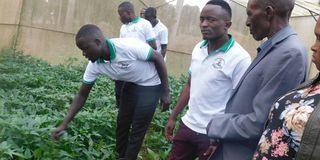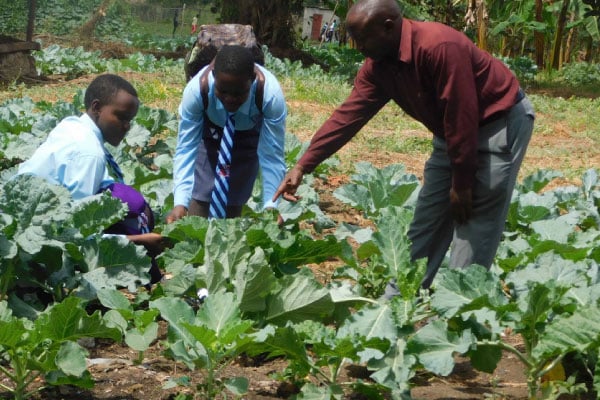Prime
Hands-on learning in farming

Leonard Ssekiddu (bending) explains something about orange fleshed sweet potato vines. PHOTO/Michael J Ssali
What you need to know:
Crops such as cabbages, carrots, or sukuma-wiki are planted on the heap receiving water and nourishment distributed from the manure hole in the centre. All the work was done by the students under the guidance of the teachers
Since the government encourages the youth to take up farming as a form of self-employment there is an obvious need to give them some skills that will turn them into successful farmers.
Agriculture is a science subject commonly taught in schools. It is also the main subject in farming colleges. People who get such training have greater chances of becoming successful farmers.
Producing crops and livestock
Agriculture basically is about cultivation of land for the purpose of producing crops but it also involves livestock management like cattle keeping, fish farming, and apiary among many other farming activities. Some good schools reserve space for a school garden where students get hands-on-training in basic agricultural skills.
Leonard Ssekiddu is a first-year-student at St Mathias Mbuye Agricultural College in Rakai District aspiring to become an agricultural services extension officer and successful farmer himself. He was one of the six diploma students of St Mathias Mbuya Agricultural College who did their six months of internship at Ndiisa Farm located at Kyakanyomozi village, Kalisizo Rural Sub-county, Kyotera District.
Seeds of Gold caught up with him last week at the conclusion of their internship. He said, “I have always wanted to be a farmer just like my parents. But I want to do farming a bit differently by acquiring some basic practical training. Fortunately they took me to schools like St Kizito Sabina Primary School where as pupils we grew our own vegetables and fruits right at the school premises. I later attended St Mary’s Secondary School Sanje for both O-Level and A-Level where agriculture was greatly emphasised.”
Basics of agriculture
According to him, home gardening is growing crops on simple things like a sack of soil on which there are holes into which vegetable seedlings are planted and watered.
At the school they had lots of such bags placed nearly everywhere on the verandas. They also had ‘kitchen gardening’ which involved placing a heap of soil with a hole at the tip which is filled with organic manure and where water is regularly poured.
Crops such as cabbages, carrots, or sukuma-wiki are planted on the heap receiving water and nourishment distributed from the manure hole in the centre. All the work was done by the students under the guidance of the teachers.
The vegetables were part of the school meals and the students grew to appreciate hard work and to link it with tasty clean food that they ate. “We learnt how to produce crops on small plots of land and it was one of the reasons that I was inspired to choose agriculture as one of my subjects at A-Level.” He took Geography, Luganda, and Agriculture.
Ssekiddu told Seeds of Gold why he and five other first year students at St Mathias Agricultural College Mbuye chose Ndiisa Farm for their internship. “The college had never sent students here to do their internship. We are the first cohort. We had read about it on the internet and discovered it carried out nearly the same practices that the college emphasises. We have been busy all the time potting cloned coffee seedlings, we have harvested ripe coffee and we have roasted coffee, pounded it into powder and drunk the coffee.”
Value addition
They learnt more about orange fleshed sweet potatoes production and value addition. They learnt through practice how to make orange fleshed sweet potato flour and how to make chapatis and mandazi cakes using the flour. They were taught to cook the potato leaves as vegetables. The items were part of the menu at the farewell party held for them at the end of the six weeks of their internship at Ndiisa Farm.
They learnt about banana macro-propagation, a process that is used to get between six and 10 banana seedlings from a piece of the bottom part of the banana stem. They learnt how to make herbal tea which is a form of organic manure.
Kasekende who is a trained agriculturist said he found it quite encouraging to see so much interest among the six youth in farming. “I am not just a farmer but an agro-forest farmer. It is the reason that you can see so many trees and other plants growing all over. Some of them are habitat for insects that naturally fight the pests that we dread and seek to destroy with pesticides. Some of the shrubs and plants are medicinal and should be preserved for posterity.” His farm measuring 50 acres is planted with Robusta coffee, plantains, maize, beans, sweet potatoes, and a whole range of vegetables. He also keeps poultry, cows, goats and pigs. He has an irrigation system to turn to in case the rains fail. He has a maize grinding machine. The students were able to learn about the advantages of mixed farming. He has a lot of livestock manure which he uses to achieve vigorous growth for the crops.




